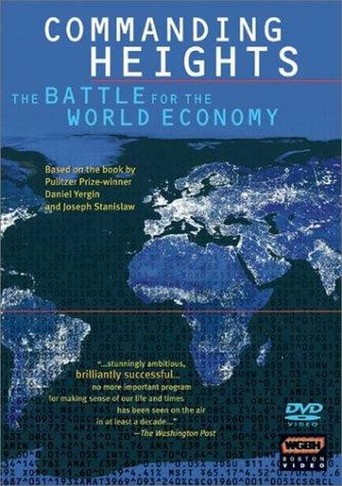

What makes it different from others?
... View MoreSimple and well acted, it has tension enough to knot the stomach.
... View MoreWhile it is a pity that the story wasn't told with more visual finesse, this is trivial compared to our real-world problems. It takes a good movie to put that into perspective.
... View MoreIt really made me laugh, but for some moments I was tearing up because I could relate so much.
... View MoreThere are so many errors in this documentary it should be categorized as fiction. I am writing this from Greece and the line about Greece and dictatorships is totally misleading. There was for a short period a terrible time when the military junta was in power, but it is important to remember the junta was initiated by Kissinger and supported by the USA. The script is quite muddled because it seems quotes from those appearing in the film have been clipped in order to present the view of the authors. Too much emphasis was on congratulating economists for the prizes they have won rather than offering new analysis on the issues. A range of views was not available in the documentary. The other flaws are too numerous to list. The book has even more.
... View MoreGlobalization is a polarizing topic. This documentary was made at a time obviously before the obvious nadir for free market economics of this year, 2008. With the fall of Lehmann Brothers, Bear Stearns, Chrysler, GM and the precarious situation of many other large conglomerates the hypotheses have been discredited slightly that have been presented here.A new era is dawning as I write this. The cycles that have been depicted here in Part 1 are continuous and the "Austrian School" cycle is in its last days, in my humble opinion. This documentary shows, truthfully, how Keynesian economics was discredited and replaced in the Western Economies after the turbulent decade of the 1970s. What isn't mentioned is that several other western powers did not embrace the market-solutions of the USA and UK. France, Germany, Scandinavia and Japan all continued to follow certain Keynesian parameters. The miracles of Hayek-style solutions is portrayed with little counterbalancing examples of its negative sides.PBS has really tried hard to give an extensive depiction of the development of globalization since the war. There was much here that I did not know before. The many interviews with Sachs, Clinton, Cheney, de Soto and numerous Heads of State or former Heads of State from Asia and Europe. However, the skew in favour of the process of globalisation is all too evident. Few dissenting opinions are detailed or extensively dealt with. The usual arguments of pulling several people out of poverty, and the industrialisation of the developing world are constantly reiterated to imply, cleverly, that globalisation is an irreversible and beneficial process to everyone. However, I am well versed in this topic, and my reading does not extend to Naomi Klein and Michael Moore, but the problems and difficulties that accompany globalisation are not really even hinted at in this documentary.What this film shows is a good start. A good basis for knowledge for beginners about globalisation. However, my advise is get out and read, get out and discover. There are many issues left untouched in this documentary. It is amazingly interesting to look back at this film after the failures of the Bush administration and watch Richard Cheney say that few people have been harmed in the process of globalisation. We all know now that Cheney is not exactly someone who really has altruistic instincts as his core beliefs.I'm giving this documentary 7 out of 10 because its technical quality and depth with the amount of information and many interviews. However, its rightward tilt slightly unnerved me. Yet it does deliver a rational argument, despite being incomplete, about the whole discussion that does dominate a lot of contemporary political debate. So watch it and start reading.
... View MoreI feel that this is one of, if not the, best documentary I have watched. As an introduction to the political economy, poverty and globalisation, it is a must-watch for anyone who is interested in current events, or is entering university/college doing anything in economics, international affairs or politics. The reason why this documentary is so good - apart from the production quality, huge amount of interviewees - is that it takes at times complex economic arguments and policies and boils them down in such a way that anyone can understand the concepts. While it is a rather large documentary, it is well-worth the look for anyone who has an interest in contemporary affairs.
... View MoreThis should be required viewing for everyone; freely, of course. As an economist, this was pure unadulterated pleasure. The professionalism, photography, music, editing, and storytelling were so superb I'm stunned at its quality and power to rivet everyone to their seats. If this is the only documentary you ever see, please see this series, you'll bless the day you did and you'll stun everyone at cocktail parties with your grasp of the most important ideas and the history of the last century.This series was especially powerful after having just returned from a tour of Eastern Europe and seeing the Museum of Communism in Prague, and the physical ravages of Communism in the Eastern Block which are still very evident even after 14 years of freedom. We, as Americans, have no idea how incredibly lucky we are. This series will help you understand.
... View More